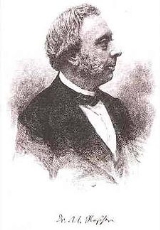
Wilhelm Georg Friedrich Roscher
Overview
Germany
Germany , officially the Federal Republic of Germany , is a federal parliamentary republic in Europe. The country consists of 16 states while the capital and largest city is Berlin. Germany covers an area of 357,021 km2 and has a largely temperate seasonal climate...
economist
Economist
An economist is a professional in the social science discipline of economics. The individual may also study, develop, and apply theories and concepts from economics and write about economic policy...
from Hanover
Hanover
Hanover or Hannover, on the river Leine, is the capital of the federal state of Lower Saxony , Germany and was once by personal union the family seat of the Hanoverian Kings of Great Britain, under their title as the dukes of Brunswick-Lüneburg...
.
He studied at Göttingen, where he became a member of Corps Hannovera
Corps Hannovera Göttingen
thumb|Bismarck 1836The Corps Hannovera Göttingen is one of the oldest German Student Corps, a Studentenverbindung or student corporation founded 18 January 1809 at the Georg August University of Göttingen by students like Georg Kloss. The name was chosen because the founders had their home...
, and Berlin, and obtained a professorship at Göttingen in 1844 and subsequently at Leipzig
University of Leipzig
The University of Leipzig , located in Leipzig in the Free State of Saxony, Germany, is one of the oldest universities in the world and the second-oldest university in Germany...
in 1848.
The main origins of the historical school of political economy may be traced to Roscher. Its fundamental principles are dated to his Grundriss zu Vorlesungen über die Staatswirtschaft nach geschichtlicher Methode (1843).
Roscher tried to establish the laws of economic development by using the historical method from the investigation of histories legal, political, cultural and other aspects.
Roscher developed a cyclical theory
Cyclical theory
The cyclical theory refers to a model used by historian Arthur Schlesinger to attempt to explicate the fluctuations in politics throughout American History. Liberalism and conservatism are rooted in the “national mood” that shows a continuing shift in national involvement between public purpose and...
where nations and their economies pass through youth, manhood and senile decay.
“The method of a science is of greater significance by far than any single discovery, however amazing the later may be.” This was in direct contrast to the English traditional economist who believed that the principals of a science were only exposed long after they had performed their duties.
This short study was afterwards expanded into his great System der Volkswirthschaft, published in five volumes between 1854 and 1894, and arranged as follows:
- vol.
Unanswered Questions

